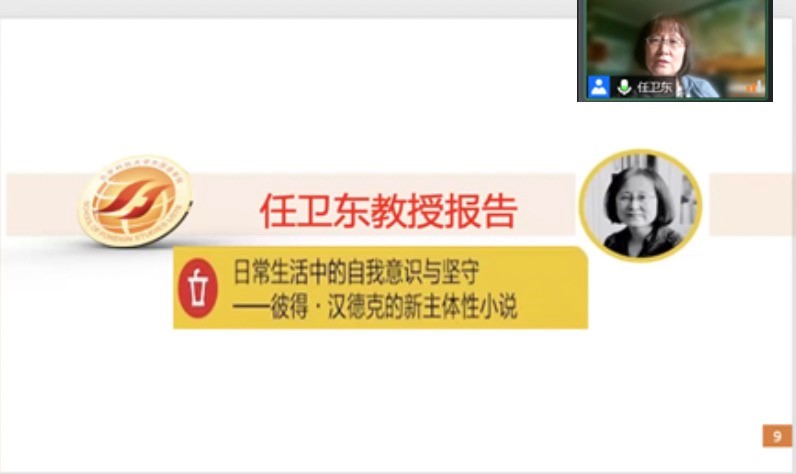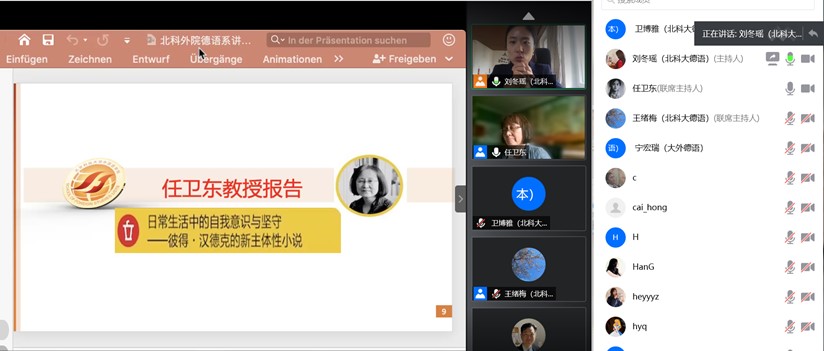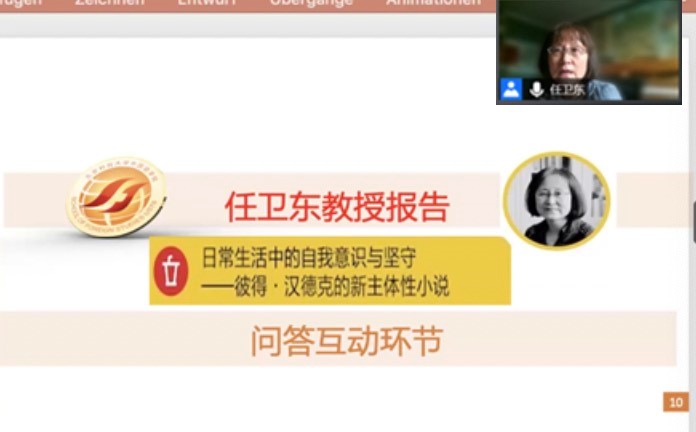The 3rd Session of the Seminar on Peter Handke

On June 13, 2020, 15:00 p.m, the SFS invited Professor Ren Weidong from School of German of Beijing Foreign Studies University (BFSU) to attend the 27th lecture of The Road to Worldwide Humanities and Exchange and Collaboration with Invited Experts of Department of German Language and Literature. In the two-hour online seminar, Professor Ren Weidong took the example of Peter Handke’s two representative works in the New Subjectivity Literature, Wunschloses Unglück and Die linkshändige Frau, and made a wonderful presentation entitled “Self-consciousness and Persistence in Daily Life: Peter Handke’s new subjectivity novels”. Although it was an online activity, the passionate enthusiasm of the participants remained undiminished. After the presentation session, Professor Ren also had a lively discussion and exchange with nearly 200 students and teachers from nearly 25 universities including Peking University, Tsinghua University, Tongji University, Beijing Foreign Studies University, Sichuan International Studies University, Xi’an International Studies University, Dalian University of Foreign Languages and Guangdong University of Foreign Studies University.

First, Mrs. Liu Dongyao, the host from Department of German Language and Literature, made a brief introduction to Professor Ren with agreeable words and familiar teaching materials, creating a warm and lively atmosphere. Ren is a professor of BFSU and Doctoral Supervisor specializing in teaching and research in German literature. Her main researches include modern German literature, the history of German literature, reception aesthetics, modernism, Franz Kafka Studies and so on. Her representative works include Kafka in China.Rezeptionsgeschichte eines Klassikers der Moderne, the history of German literature, Volume III, Contemporary Foreign Literature Chronicle 1980-2000, Volume III, and Contemporary College German, which are familiar to both teachers and students.

At the beginning of the lecture, Professor Ren first shared her exchange with Handke in 2016, skillfully attracted our attention on Handke’s work through anecdotes, and reviewed Handke’s creative experiences in different periods. Then she focused on the “new subjectivity” of German literature in the 1960s and 1970s. Professor Ren argued that Peter Handke writer on humanism whose half century of literary creation has always focused on the conflict between the individual and the world with the theme of caring for the individual. With extreme forms, he exposed and accused the individual of losing himself in various orders, and worried about the human condition and sought for a better world covered by his abusive, speechless, rebellious, callous looking with self-imposed introspection. Adopting the viewpoint of the German philosopher Odos Marquette, Professor Ren then analyzed the content of Wunschloses Unglück and Die linkshändige Frau in detail, analyzed violence inflicted on mother in daily life and the inner motivation of mother’s longing for “non-daily”, and analyzed Handke’s literary theme of “self-recognition” through the experience of mother’s self-seeking in reading from the new perspective of “the relationship between man and daily life”. Writing about the mother’s desireless and miserable life also prompted Handke to write Die linkshändige Frau. Analyzing and comparing Marianne with hermother, Professor Ren pointed out that the Die linkshändige Frau is a woman who lives following her own desires as the complete opposite of to her mother. Quoting Henri Lefebvre’s views, Ren argued that the leading character and the writer’s attitude towards daily life—making a leap in everyday life through thinking, poetry, and love. Based on these points, Professor Ren made a detailed analysis of the literature, songs and paintings in novels, recreating the process of Marianne’s self-seeking, and made a further interpretation. She pointed out that leading characters in both novels are women. While gender is an obvious issue, Handke took the women’s otherness to demonstrate how an individual in a universal sense to reject the outside influence and keep himself in the daily life of collectivity and sociality. It has gone beyond the limits of feminism and brought more universal significance. Handke is a writer who is constantly pushing his boundaries and finding new ways to write, not a formalism experimenting with literature. What he hopes is to convey his observation and thinking about life through various forms, so that readers can live more consciously. In this sense, he is not an “ivory tower dweller” in his own description.
As the translator of the Chinese version of Die linkshändige, Professor Ren has a deep understanding reflecting in the innovative and enlightening presentation. After the presentation, Mrs. Liu Dongyao made a brief summary and shared her understanding of “the boundaries of humanity” in Nobel’s award speech. Then in the Q&Asession teachers and students actively discussed with Professor Ren. Ding Yajing, a teacher in the Department of German of Tianjin Foreign Studies University, expressed her own opinions and come up with the questions about the symbolic meaning of the leading character’s declaration in Die linkshändige. Ma Xinran, a junior enrolled in 2017 in Department of German Language and Literature, also raised questions about the relationship between the ending of Wunschloses Unglück and Die linkshändige. The participants included Lin Xiaoping, a doctoral student in Research Institute Of Foreign Literature at the Beijing Foreign Studies University, Jiang Wei, a Master’s student at Peking University, Li Mingming, an associate professor in the Department of Foreign Languages at Tsinghua University, Ding Junjun, an associate professor at the Beijing Foreign Studies University, and Zheng Mengya, an associate professor in the Department of German at Sichuan University of Foreign Languages. In the meantime, others also exchanged views and discussed with Professor Ren.

The two hours are fleeting. With gentle voice and pleasant smile, Professor Ren interpreted the main content of the two novels and their connections in detail, and revealed the profound theme behind the text through plain words and a unique perspective. At the end of the lecture, the participants expressed their regret for the conclusion and thanked Professor Ren for her wonderful sharing, and also expressed their gratitude to USTB for providing such an excellent platform and opportunity for teachers and students of the German language and literature in China.
Contributor: Ma Xinran
